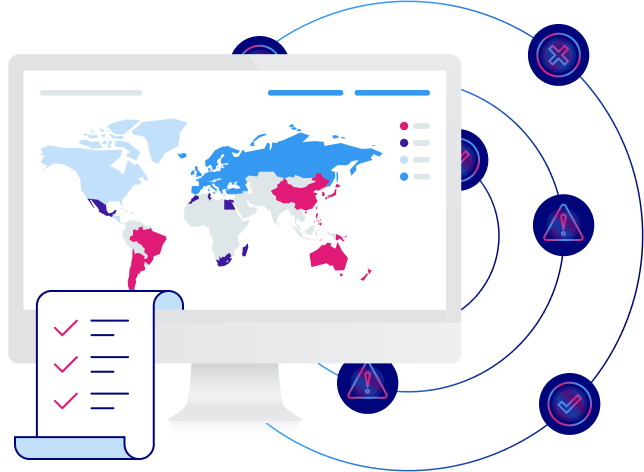-
Solutions
- AI Governance
- AI Risk
- Geo-Specific Cookie Banner
- Consumer Preference Management
- Data Subject Request Automation
- Data Mapping and Vendor Risk Management
- Privacy, Vendor, and Risk Assessments
- Privacy Program Management
- Regulatory Guidance
- Privacy Program Consulting
- Certifications and Verifications
- International Data Transfers
Forrester TEI ROI of Privacy ReportTrustArc commissioned a Forrester study to analyze the potential benefits of using our platform and the Forrester team found ROI linked to efficiency, compliance, and decreased cost in data breaches.
Read the report -
Products Products Privacy Studio Overview
Automate consent and data subject rights compliance. Design seamless privacy experiences to enhance customer trust across your digital landscape.
- Cookie Consent Manager Effortlessly manage cookie consent for global compliance, ensuring a secure, personalized browsing experience.
- Consent & Preference Manager Easily manage and orchestrate customer consent and preferences across brands and channels.
- Individual Rights Manager Automate and streamline DSR workflows to ensure compliance and show your commitment to customer rights.
- Trust Center Quickly centralize, manage, and showcase all trust and safety information in an easily customizable, no-code hub.
Products Governance Suite OverviewStay ahead of privacy and compliance regulations. Simplify data privacy management and ensure data governance with cutting-edge apps.
- PrivacyCentral Centralize privacy tasks, automate your program, and seamlessly align with laws and regulations.
- Data Inventory Hub & Risk Profile Gain full visibility and control of your data and accurately identify and mitigate risks.
- Assessment Manager Automate and score privacy assessments like PIAs and AI Risk, streamlining your compliance workflow.
- Nymity Research Get instant access to the latest in privacy regulations, legal summaries, and operational templates.
Products Assurance Services OverviewGain trust and credibility with leading privacy certifications from unbiased experts, backed by technology for unmatched privacy compliance assurance.
- Dispute Resolution
- TRUSTe Enterprise Privacy Certification
- TRUSTe EDAA Privacy Certification
- TRUSTe APEC CBPR and PRP Certification
- TRUSTe Data Collection Certification
- CCPA/CPRA Validation
- Data Privacy Framework Verification
- GDPR Validation
- Digital Advertising Alliance Validation
- TRUSTe Responsible AI Certification
-
Regulations
- EU General Data Protection Regulation (GDPR)
- California Consumer Privacy Act (CCPA)
- Virginia Consumer Data Protection Act (CDPA)
- NIST AI Framework
- ISO/IEC 27001
EU Artificial Intelligence Act (EU AI Act)EU's regulation on the use of AI and the world's first comprehensive AI law.
Learn moreData Privacy Framework (DPF)Transatlantic data transfer mechanism for EU-U.S., UK, and Swiss-U.S. commerce.
Learn more - Resources
- Contact us
Act on the Protection of Personal Information (APPI)
Japan’s APPI applies to all business operators that handle the personal data of individuals in Japan, including organizations that are located within Japan and those with offices outside of the country.
Are you subject to the APPI?
Japan’s APPI applies to personal information handling business operators that:
-
Supply good or services to persons in Japan
-
Handle personal information of individuals in Japan
-
Pseudonymously or anonymously processed information produced by the personal information, even if the processing takes place in a foreign country
Key obligations under the APPI
Notification
Under the APPI, organizations collecting personal data must inform individuals about the purpose for which the data is being collected, This notification typically includes details such as the purpose of use, the scope of use, and any potential third-party recipients of the data. Notification should be provided in a clear and easily understandable manner, ensuring that individuals are fully aware of how their personal data will be utilized.
Consent
Consent is a fundamental principle under the APPI. Organizations must obtain explicit consent from individuals before collecting, using, or disclosing their personal data. Consent should be obtained through affirmative action, such as ticking a box or signing a consent form, and should be freely given, specific, informed, and unambiguous. Individuals have the right to withdraw their consent at any time, and organizations must respect this right.
Purpose Limitation
The APPI defines that personal data should only be collected for legitimate and specified purposes that are clearly communicated to individuals. Organizations are prohibited from using personal data for purposes other than those for which it was originally collected without obtaining additional consent from the individuals concerned.
Security Measures
Under the APPI, organizations are required to implement appropriate security measures to protect personal data from unauthorized access, disclosure, alteration, or destruction. This may include physical, technical, and organizational safeguards, such as encryption, access controls, and employee training on data protection.
Data Transfer Restrictions
According to the APPI, personal data cannot be transferred to third parties without the consent of the individuals concerned, unless permitted by law. If personal data is transferred to third parties, organizations must ensure that the recipients provide an adequate level of protection for the data.
Accuracy
The APPI outlines that organizations are responsible for ensuring that personal data is accurate, complete, and up-to-date. They must take responsible steps to verify the accuracy of the data at the time of collection and periodically update it as necessary.
Access and Correction
Under the APPI, individuals have the right to access their personal data held by organizations and request corrections or deletions if the data is inaccurate or outdated. Organizations must establish procedures for handling such requests in a timely manner and may only refuse requests in specific circumstances as allowed by the law.

Building Trust and Competitive Advantage: The Value of Privacy Certifications
Join our experts in this webinar as they go over the importance of how privacy certifications can unlock business value and help you stay ahead of the competition in today’s privacy-conscious landscape.
Achieve compliance
-
Privacy program development and compliance management Identify gaps and track compliance with PrivacyCentral – assess Japan APPI regulation specifics and get automatic guidance on building out a sustainable privacy program.
-
Complete and maintain a data inventory Automate with Data Inventory Hub. Save time and reduce risk with automated data flow mapping, risk analysis, and remediation for personal data processes and data transfer risks.
-
Exercising individual rights Enjoy DSR automation with TrustArc’s Individual Rights Manager. Easily operationalize individual rights according to specific jurisdictions, leverage automated workflows to save time, and keep an audit trail of requests/actions.

The information provided does not, and is not intended to, constitute legal advice. Instead, all information, content, and materials presented are for general informational purposes only.




